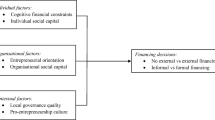Abstract
Interest in entrepreneurship has increased dramatically over the last two decades. Because of the role that entrepreneurship plays in economic development, an understanding of the financing of business start-ups is essential. A long-standing problem for many business start-ups is acquiring external equity during the first year of operations. This paper analyzes the determinants of obtaining external equity. Special consideration is given to the role of entrepreneurial experience. The results suggest that entrepreneurial experience impacts a start-up's ability to obtain external equity.
Similar content being viewed by others
References
Acs, Zoltan, and David Audretsch . 2003. “Introduction to the Handbook of Entrepreneurial Research,” in Handbook of Entrepreneurial Research: An Interdisciplinary Survey and Introduction, edited by Zoltan Acs and David Audretsch. Kluwer, 3–21.
Ballou, J., T. Barton, D. DesRoches, F. Potter, E.J. Reedy, and A. Robb . 2008. Kauffman FirmSurvey: Results from the Baseline and First Follow-up Surveys. Kauffman Foundation.
Berger, Allen N., and Gregory F. Udell . 1998. “The Economics of Small Business Finance: The Roles of Private Equity and Debt Markets in the Financial Growth Cycle.” Journal of Banking and Finance, 22 (6–8): 613–673.
Cassar, Gavin . 2004. “The Financing of Business Start Ups.” Journal of Business Venturing, 19 (October): 261–283.
Coleman, Susan, and Alicia Robb . 2009. “A Comparison of New Firm Financing by Gender: Evidence from the Kauffman Firm Survey Data.” Small Business Economics, 33 (May): 397–411.
Cooper, Arnold C., F.J. Gimeno-Gascon, and C.Y. Woo . 1994. “Initial Human and Financial Capital as Predictors of New Venture Performance.” Journal of Business Venturing, 9 (5): 371–395.
DeBaise, Colleen . 2010. “Start-Ups Will Keep Struggling in 2010,” Wall Street Journal (January 5): B1.
Denis, David J. 2004. “Entrepreneurial Finance: An Overview of the Issues and Evidence.” Journal of Corporate Finance, 10: 301–326.
Gompers, Paul, and Joshua Lerner . 2003. “Equity Financing,” in Handbook of Entrepreneurial Research: An Interdisciplinary Survey and Introduction, edited by Zoltan Acs and David Audretsch. Kluwer, 267–298.
Helwege, Jean, and Nellie Liang . 1996. “Is There a Pecking Order? Evidence from a Panel of IPO Firms.” Journal of Financial Economics, 40 (3): 429–458.
Hogan, T., and E. Hutson . 2005. “What Factors Determine the Use of Venture Capital? Evidence from the Irish Software Sector.” Venture Capital: An International Journal of Entrepreneurial Finance, 7 (3): 259–283.
Holtz-Eakin, Douglas . 2000. “Public Policy Toward Entrepreneurship.” Small Business Economics, 15 (4): 283–291.
Kauffman Foundation, 2010. http://www.kauffman.org/kfs/.
Lerner, Josh . 2009. Boulevard of Broken Dreams: Why Public Efforts to Boost Entrepreneurship and Venture Capital Have Failed—and What to Do About It. Princeton University Press.
Minniti, Maria . 2008. “The Role of Government Policy on Entrepreneurial Activity: Productive, Unproductive, or Destructive?” Entrepreneurship Theory and Practice, 32 (5): 779–790.
Myers, Stewart C. 1984. “The Capital Structure Puzzle.” The Journal of Finance, 39 (3): 575–592.
Paul, S., G. Whittam, and J. Wyper . 2007. “The Pecking Order Hypothesis: Does It Apply To Start-up Firms?” Journal of Small Business and Enterprise Development, 14 (1): 8–21.
Robb, Alicia . 2002. “Entrepreneurial Performance by Women and Minorities: The Case of New Firms.” Journal of Developmental Entrepreneurship, 7 (4): 383–397.
Vanacker, T., and S. Manigart . 2008. “Pecking Order and Debt Capacity Considerations for High-growth Companies Seeking Financing.” Small Business Economics, 35 (1): 53–69.
Acknowledgements
The author is grateful to James Giordano and two anonymous referees for their helpful comments and suggestions and to the Kauffman Foundation for granting public access to the Kauffman Firm Survey. Certain data included herein are derived from the Kauffman Firm Survey release 3.1. Any opinions, findings, and conclusions or recommendations expressed in this material are those of the author and do not necessarily reflect the views of the Ewing Marion Kauffman Foundation.
Additional information
*Peter A. Zaleski is a professor of Economics at the Villanova School of Business, Villanova University, received his Ph.D. in Economics with a concentration in Industrial Organization from the University of Maryland. His research on related areas has been published in Review of Industrial Organization, Journal of Economics and Business, and Public Finance Review.
Rights and permissions
About this article
Cite this article
Zaleski, P. Start-Ups and External Equity: The Role of Entrepreneurial Experience. Bus Econ 46, 43–50 (2011). https://doi.org/10.1057/be.2010.41
Published:
Issue Date:
DOI: https://doi.org/10.1057/be.2010.41




